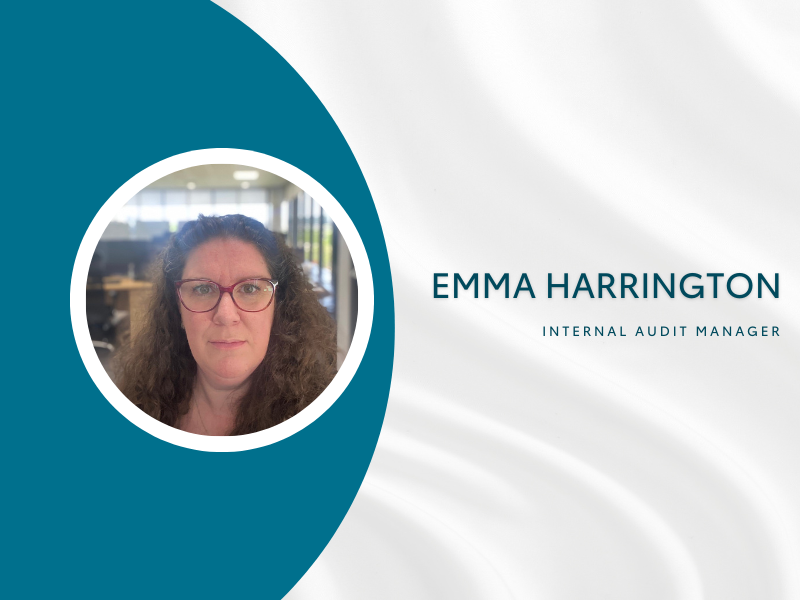15th June 2023
Meet Emma Harrington, our Internal Audit Manager

To celebrate Internal Audit Awareness Month, held annually in May, we caught up with our Internal Audit Manager, Emma Harrington.
Tell us a bit more about your background and why you chose a career in this field?
There seems to be a thread right from college studies and throughout my career. I’ve always been interested in anything that looked to analyse and understand why things work in a certain way, and finding if there was a better way. This carried on through to a process leadership and internal controls assessment role. Internal Audit was the next logical step. I made a trial audit engagement and caught the interest for it right away.
Can you tell us a bit more about Internal Audit and the history of the profession?
The history to some form of internal audit is traced back to B.C. merchants verified receipts for grain brought to market (check and balance controls). There was a need for a system of controls to protect organisations and this continued to grow into until it reached its modern incarnation – The Institute of Internal Auditors (The IIA). The IIA was established in 1941 and has over 200,000 members globally with around 10,000 in the UK. So, there are at least another 9,999 of us in the UK!
What do you do as part of your role?
First, I look to deeply understand the process area by asking questions, reading policies and procedures and interviewing the process experts. Then we assess how the process works against best practises and look to identify actual or potential risks and issues. Subsequently, with the business teams’ involvement, we’d decide what actions could prevent the risks from materialising. This is then written into a report and tracked until the actions are complete.
How would you describe your role to a child?
Learning about what other people do and then working out if there is a more sensible way to do it. As an example, I don’t want to stop you climbing a tree, but I’d like to make sure you have good shoes on, it’s not too slippery or spiky, and if it’s a really big tree, maybe suggest you’d need a safety helmet and harness to protect you.
What do you enjoy the most about your role?
You are always learning something new, and if you aren’t, you’re probably not doing it right. Equally, you get to meet people from all over the business that are experts and passionate about their roles. Identifying risks and seeing things implemented to help strengthen and protect the organisation is rewarding. Because that’s what we all want a strong and sustainable organisation.
What’s the biggest misconception about Internal Audit?
“It’s checking numbers” – whilst that can be one part of it, we are thinking about all types of things that could go wrong and the impact of that. It’s not only the balance sheet, but risks to our reputation, the strategy, safety, property/assets, employees, our customers, laws and regulations and sometimes it’s about identifying opportunities.
What’s the biggest challenge that you face?
Switching off. I’ve been told “You can’t audit the world!” but you almost want to. The thought processes do spill into your personal life. I’m often thinking “Why is that happening, what’s behind that decision, what could go wrong here, what’s the risk”. It does make you question the systems behind what you observe.
What skills do you need for your role?
First and foremost, curiosity for learning and wanting improvement. A mix of critical thinking and problem solving to consider “What could happen?”. Also, communication. You need tact and diplomacy but also to be direct and honest. “No one wants to be told their baby is ugly!” is the phrase I was schooled in. You need to work out how to say that, but still say it. Resilience that’s driven by ethics, and the ability to stay objective are also key.
What training is required?
Auditors come from a range of different paths. Some are from an IT, finance or the accounting route. I came via a process leadership and controls background. The qualifications are gained by a mix of exams and years of professional experience. However, you must find your own way to deliver effective auditing though. Tough audits, challenges and critical reflection are the best learning. Internal Audit is a community, so we are always learning and challenging each other. You are always looking to develop your technical skills and business knowledge, but equally important are the soft skills. We look at processes, but we do that through people.
What do you do in your spare time?
I have an 11-year-old daughter, I study, and we have some new pets that keep me busy. There is a forever list of home improvements that I always try to tackle by myself first. I have pulled the piano out again. When there is spare time, I really enjoy painting and photography.
Any secret facts about you?
Secret daredevil! I’ve tried sky diving, open water diving, rapids rafting, horse-riding, roller coasters, tree walks, anything that makes your stomach flip a bit and pushes you beyond your daily comfort. I’m aware that these activities put you at risk, but the key is risk is inevitable, but managing that in a safe and controlled manner can produce the thrills without the ills.